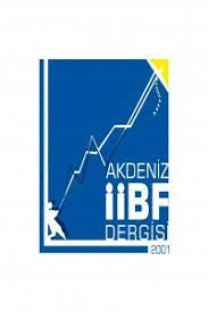Power to delay: Turkey's EU accession process within the context of a process-driven approach
Geciktirme gücü: Sürreç yönelimli bir yaklaşım bağlamında Türkiye'nin AB'ye katılım süreci
___
- AVCI, G. (2006). Turkey’s EU Politics: Consolidating Democracy through Enlargement? In Helene Sjursen (Ed.) Questioning EU Enlargement: Europe in search of Identity, Routledge, London, 62-78.
- BAĞIŞ, E. (2009). Bagis on BBC’s HardTalk. Retrieved 20.01.2010 from http://www.egemenbagis.com/index.cfm?action=index&page=newsdetails&news=577
- BELGENET (2002). AB Uyum Yasaları. Retrieved 20.01.2010 from http://www.belgenet.com/yasa/ab_uyum-1.html
- BENHABİB, S. (1999). Müzakereci Bir Demokratik Meşruiyet Modeline Doğru. In S. Benhabib (Ed.) Demokrasi ve Farklılık, WALD, Istanbul.
- DAHL, R. (1995). With the consent of all. In S. Theodoulou and M. Cahn (Eds.) Public policy: The Essential reading, Prentice Hall, New Jersey, 38-45.
- DELEGATION OF THE EUROPEAN UNION TO TURKEY (2006). Türkiye için AB üyelik müzakereleri süreci. Retrieved 20.01.2010 from http://www.avrupa.info.tr/Files/File/Publications-2006/brochures/AccessionBooklet.pdf
- DIMITRAKOPULOS, D. (2001). Incrementalism and Path-Dependence: European Integration and Institutional Change in National Parliaments. Journal of Common Market Studies, 39(3), 405-422.
- DIMITROVA, A. (2002). Enlargement, Institution-Building and the EU’s Administrative Capacity Requirement. West European Politics, 25(4), 171-190.
- DIMITROVA, A. and STEUNENBERG, B. (2004). Conclusions: the ‘end of history’ of enlargement or the beginning of a new research agenda? In A. Dimitrova (Ed.) Driven to Change: The European Union’s Enlargement Viewed from the East, Manchester University Press, Manchester.
- DROR, Y. (1989). Public Policy Making, Third Printing, Transaction Publishers, New Brunswick (USA) and Oxford (UK), 12-17.
- DÜNDAR, C. (2006). Neden? Retrieved 20.01.2010 from http://www.candundar.com.tr/index.php?Did=3729
- GORDON, I; LEWIS, J. and YOUNG, K. (1993). Introduction: Perspectives on Policy Analysis. In Michael Hill (Ed.) The Policy Process: A Reader, Harvester Wheatsheaf, New York.
- HIX, S. (2003). The End of Democracy in Europe? How the European Union (As Currently Designed) Restricts Political Competition. Retrieved 20.01.2010 from http://personal.lse.ac.uk/HIX/Working_Papers/Hix-End_of_Democracy_in_Europe.pdf
- HEISKELA, R. (2001). Theorizing power: Weber, Parsons, Foucault and neostructuralism. Social Science Information, 40(2), 241-264.
- LINDBLOM, C. E. (1995) The Science of Muddling Through. In Daniel McCool (Ed.) Public Policy Theories, Models, and Concepts: An Anthology, Prentice Hall, New Jersey, 143-157.
- LUKES, S. (1993). Three Distinctive Views of Power Compared. In M. Hill (Ed.) The Policy Process: A Reader, Harvester Wheatsheaf, London and New York.
- JAY D. W. (1990). Images of Administrative Reason and Rationality: The Recovery of Practical Discourse. In H. D. Kass & B. L. Catron (Eds.) Images and Identities in Public Administration, Sage, USA, 132-150.
- MARCH, J. G. and OLSEN, J. P. (2005). Elaborating the “New Institutionalism”. Arena Centre for European Studies, University of Oslo, Working Paper, No. 11, March 2005.
- MILLER, H. T. (2000). Rational Discourse, Memetics, and the Autonomous Liberal-Humanist Subject. Administrative Theory & Praxis, 22(1), 89-104.
- MÜFTÜLER-BAC, M. (2005). Turkey’s Political Reforms and the Impact of the European Union. South European Society and Politics, 10(1), 16-30.
- NEGRI, A. (2005). Time for Revolution, Continuum, London and New York.
- NORTH, D. C. (1993). Five Propositions about Institutional Change. Retrieved 20.01.2010 from EconWPA http://129.3.20.41/eps/eh/papers/9309/9309001.pdf
- PIERSON, P. (2000). The Limits of Institutional Design: Explaining Institutional Origins and Change. Governance, 14 (4), 475-501.
- POPPER, K. (1963). Public Opinion and Liberal Principles. In Conjectures and Refutations, Routledge and Kegan Paul, London.
- SCHIMMELFENNING, F. & SEDELMEIER, U. (2005). Conclusions: The Impact of the EU on Accession Countries. In Schimmelfenning, F. and Sedelmeier, U. (Eds) The Europeanization of Central and Eastern Europe, Cornell University Press, London.
- SPICER, M. (2004). Public Administration, the History of Ideas, and Reinventing Government Movement. Public Administration Review, 64 (3), 352-362.
- SMITH, B. C. (1988). Bureaucracy and Political Power, Wheatsheaf Books Ltd, Brighton.
- ŞENER, H. E. (2009) Administrative Reform as an Opportunity: The EU Accession Process in Hungary and Turkey, Phoenix, Ankara.
- TBMM (2001). Türkiye Cumhuriyeti Anayasasının Bazı Maddelerinin Değiştirilmesi Hakkında Kanun. Retrieved 20.01.2010 from http://www.tbmm.gov.tr/kanunlar/k4709.html
- WEBER, M. (1947). The Theory of Social and Economic Organization, Oxford University Press, UK.
- WILLIAMS, H. and FEARON-JONES, J. (1992). Jürgen Habermas and Neo-Marxism. In L. Tivey and A. Wright (Eds.) Political thought since 1945: Philosophy, science, ideology, Edward Elgar, England and USA.
- Interviews
- ATALAY, I. (2009) Interview with Ilgın Atalay (Head of Foreign Affairs, Prime Ministry) by Erol Esen and Hasan Engin Şener on 27 April 2009.
- BAYGÜN, S. (2009) Interview with Sema Baygün (Head of Department, Undersecretariat of the Foreign Trade) by Erol Esen and Hasan Engin Şener on 30 April 2009.
- GÜÇLÜOL, L. (2009) Interview with Lale Güçlüol (EU Expert, Ministry of the Interior) by Erol Esen and Hasan Engin Şener on 27 April 2009.
- YILMAZ, T. and SAVACI, Ö. (2009) Interview with Tolunay Yılmaz and Özlem Savacı (EU Experts, Ministry of Culture and Tourism) by Hasan Engin Şener on 29 April 2009.
- ISSN: 1302-9975
- Yayın Aralığı: Yılda 2 Sayı
- Başlangıç: 2001
- Yayıncı: Akdeniz Üniversitesi
Antalya Serbest Bölgesi'nde yat üretim kümesinin gelişimi: Kaynaklara dayalı bir analiz
Onur DİRLİK, Fulya SARVAN, Tuğba YENİDOĞAN GÜRÇAYLILAR, Eren DURMUŞ
Birikim ve kriz: Radikal bir yaklaşım
Celal TAŞDOĞAN, Ahmet ŞAHİNÖZ, Selim ÇAĞATAY
Power to delay: Turkey's EU accession process within the context of a process-driven approach
NATO ve AB'nin değişen güvenlik stratejilerinin Afganistan örneğinde değerlendirilmesi
